
European Journal of Risk Regulation
Scope & Guideline
Fostering dialogue on law and safety in Europe.
Introduction
Aims and Scopes
- Risk Regulation in Technology and Innovation:
The journal explores the regulatory challenges associated with emerging technologies, including artificial intelligence, biotechnology, and digital services, emphasizing the need for frameworks that ensure safety, accountability, and ethical considerations. - Sustainable Food and Environmental Governance:
A significant focus is placed on the regulation of food systems, environmental risks, and sustainability practices, particularly within the context of EU policies and international agreements. - Public Health and Safety Regulation:
The journal addresses the legal and regulatory frameworks that govern public health, particularly in light of crises such as pandemics, and the implications for individual rights and state responsibilities. - International Trade and Regulatory Cooperation:
Exploration of the interplay between international trade regulations and domestic laws, particularly concerning food safety, environmental standards, and public health measures. - Behavioral Insights in Regulation:
The incorporation of behavioral economics into regulatory practices is examined, focusing on how understanding human behavior can enhance compliance and the effectiveness of regulatory measures.
Trending and Emerging
- Regulatory Frameworks for Artificial Intelligence:
There is a significant increase in research addressing the complexities of regulating AI technologies, focusing on ethical implications, accountability, and the need for comprehensive governance structures. - Integration of Sustainability in Regulatory Practices:
Emerging themes emphasize the integration of sustainability principles into regulatory frameworks, particularly in food systems and environmental governance, reflecting a broader societal shift towards sustainable practices. - Interdisciplinary Approaches to Risk Regulation:
A trend towards interdisciplinary research is evident, with increasing collaboration across legal, economic, and behavioral disciplines to address complex regulatory challenges. - Public Participation and Transparency in Regulation:
Recent publications underscore the importance of public participation and transparency in regulatory processes, particularly in the context of health crises and environmental governance. - Emerging Health Risks and Regulatory Responses:
The journal is increasingly focusing on the regulation of emerging health risks, particularly in relation to pandemics and public health initiatives, highlighting the need for agile regulatory responses.
Declining or Waning
- Traditional Risk Assessment Models:
There has been a notable decrease in publications focused solely on traditional risk assessment methodologies, as the field shifts towards more dynamic and integrated approaches that consider behavioral and systemic factors. - Sector-Specific Regulations without Cross-Sectoral Perspectives:
A decline in articles addressing regulations that are narrowly focused on individual sectors suggests a move towards interdisciplinary research that considers the interconnectedness of various regulatory frameworks. - Static Legal Frameworks in Environmental Governance:
Research on rigid legal frameworks for environmental governance appears to be waning, possibly due to a growing recognition of the need for adaptive and flexible regulatory approaches that can respond to changing environmental conditions.
Similar Journals
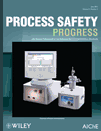
PROCESS SAFETY PROGRESS
Innovating solutions for a safer tomorrow.PROCESS SAFETY PROGRESS is a distinguished journal published by WILEY, focusing on the critical intersections of chemical engineering and safety, risk, reliability, and quality. Established in 1993, this peer-reviewed journal serves as a significant platform for disseminating high-quality research findings and innovative solutions in process safety. With an established impact within its fields, it holds a Q3 categorization in both Chemical Engineering and Safety, Risk, Reliability and Quality as of 2023. The journal's rigorous manuscript evaluation process, combined with its emphasis on emerging challenges and solutions in industry practices, makes it a crucial resource for researchers, industry professionals, and students alike. Although not Open Access, PROCESS SAFETY PROGRESS continues to enhance its visibility through its indexed presence in Scopus, where it ranks in the 50th percentile in its categories. As it converges to its 2024 volume, the journal remains committed to promoting advancements in the field and fostering a safer environment in chemical process engineering.
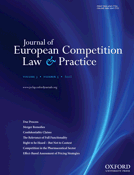
Journal of European Competition Law & Practice
Elevating Standards in European Legal ScholarshipJournal of European Competition Law & Practice, published by Oxford University Press, serves as a vital resource in the field of law, specifically focusing on competition law within the European context. With an ISSN of 2041-7764 and an E-ISSN of 2041-7772, this esteemed journal is dedicated to discussing contemporary issues, legal analysis, and policy implications surrounding competition law, and it enjoys a commendable Q2 ranking in the Law category according to Scopus. Researchers and professionals will benefit from its insightful articles, which span a broad spectrum of topics, including antitrust regulation, market dominance, and consumer protection. Although it is not an open-access journal, it provides valuable indexed content, boasting a robust presence in the legal scholarship community, particularly with a Scopus ranking of #449 out of 1025 in the social sciences law category, placing it in the 56th percentile. The journal's commitment to high-quality, peer-reviewed scholarship makes it essential reading for anyone involved in the study or practice of European competition law.

Revista de Derecho Comunitario Europeo
Pioneering Research in European Community Law and PolicyRevista de Derecho Comunitario Europeo, published by CENTRO ESTUDIOS POLITICOS CONSTITUCIONALES, serves as a vital platform for scholarly dialogue in the fields of Law, Political Science, and International Relations. Established in 2008, this esteemed journal focuses on the analysis of European Community Law, providing insightful articles that explore the dynamic intersection of legal frameworks and political science within the European context. Although currently categorized in the Q4 quartile for its fields, the journal is dedicated to enhancing its impact and visibility, particularly among researchers and practitioners interested in the evolution of European legal structures. While it does not offer open access, its rigorous peer-review process ensures the publication of high-quality research, making it a crucial resource for students and professionals aiming to deepen their understanding of contemporary legal and political issues in Europe. The journal's commitment to advancing scholarship in these areas is reflected in its ongoing publication through 2024, situated in Madrid, Spain.

Yale Journal on Regulation
Elevating the Standards of Regulatory ScholarshipThe Yale Journal on Regulation is a distinguished academic publication dedicated to the exploration of regulatory issues within the fields of law and public administration. Established in the United States and published by the prestigious YALE JOURNAL ON REGULATION, this journal serves as a critical resource for professionals, scholars, and students alike. With an ISSN of 0741-9457 and an E-ISSN of 2376-5925, it is recognized for its significant contributions to the discourse on regulatory practices, policy analysis, and legal frameworks that shape public administration. As of 2023, the journal has achieved impressive rankings, placing in the Q1 category for Law and Q2 category for Public Administration, reflecting its high impact and relevance in these fields. The journal's commitment to rigorous scholarship can be seen in its Scopus rankings, where it stands at #158 out of 1025 in Social Sciences Law, placing it in the 84th percentile, while also making its mark at #102 out of 232 in Public Administration. Although it does not currently offer an open access model, the journal remains a vital resource for those seeking to stay abreast of important developments and emerging trends in regulatory affairs. Join a community of thought leaders and contribute to the vital conversations that influence the regulatory landscape.

Manchester Journal of International Economic Law
Exploring the Intersection of Law and Economic InnovationThe Manchester Journal of International Economic Law is a pivotal academic publication in the realms of international law and economic law, established to foster critical discourse and scholarship in these vital areas. Published by ELECTRONIC PUBL LTD, this journal has been contributing to the academic community since its inception, with coverage spanning from 2013 to 2024. While it does not currently offer open access, it nonetheless provides valuable insights into complex legal and economic frameworks, earning a respectable Q3 ranking in Law and a Q4 ranking in Economics and Econometrics as of 2023. Researchers and professionals will find the journal's rigorous peer-review process essential for disseminating high-quality research, as it aims to bridge the gap between legal theory and economic applications, thus enriching both fields. Scholars interested in the intersection of these disciplines will benefit from accessing its rich content, fostering innovative dialogue and collaboration in the dynamic landscape of international economic law.
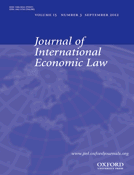
JOURNAL OF INTERNATIONAL ECONOMIC LAW
Innovating Understanding of Global Economic PoliciesWelcome to the JOURNAL OF INTERNATIONAL ECONOMIC LAW, a prestigious academic journal published by Oxford University Press, dedicated to the interdisciplinary exploration of the intricate relationship between law and economics on a global scale. Since its inception in 1998, this quarterly journal has developed a reputation for excellence, currently holding a Q1 ranking in both Economics, Econometrics and Finance and Law categories. With an impressive Scopus ranking that places it in the 94th percentile for law and the 82nd percentile for economics, it serves as an essential resource for researchers, professionals, and students aiming to advance their understanding of international economic regulations and policies. Our goal is to foster scholarly dialogue and inform legal practices by publishing cutting-edge research, critical reviews, and comprehensive analyses relevant to contemporary issues in international economic law. Although the journal maintains subscription-only access, it remains a crucial platform for disseminating influential ideas and practices within the global academic community, encouraging rigorous debate and innovative thinking in this dynamic field.

HEALTH PHYSICS
Advancing Knowledge in Radiation HealthHEALTH PHYSICS is a leading academic journal dedicated to the study and dissemination of knowledge in the fields of radiology, epidemiology, and health toxicology. Published by Lippincott Williams & Wilkins, this esteemed journal has been a cornerstone of research since its inception in 1958, and it continues to foster important discussions and advancements in the discipline. With a notable impact factor and consistently ranking in the Q2 and Q3 quartiles across various categories in 2023, HEALTH PHYSICS serves as a vital resource for scholars, practitioners, and students seeking the latest insights and methodologies in the management of radiation exposure and its health implications. While the journal does not offer open access, it remains a critical platform for peer-reviewed articles that contribute to public health and environmental safety. The journal's comprehensive scope and historical significance underscore its importance in advancing knowledge and practices within its field, making it an essential read for anyone engaged in the multidisciplinary realms of health physics.
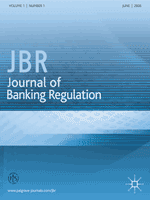
Journal of Banking Regulation
Fostering Insightful Discussions on Economic Trends.Journal of Banking Regulation is a premier academic journal published by Palgrave Macmillan Ltd. based in the United Kingdom, contributing significantly to the fields of Economics and Finance. With an ISSN of 1745-6452 and an E-ISSN of 1750-2071, this journal serves as a vital platform for the dissemination of cutting-edge research that addresses the complexities of banking regulations in a rapidly evolving financial landscape. As a Q3 ranked journal in both Economics and Econometrics and Finance categories, it holds a respectable position among its peers, with Scopus ranks highlighting its impact within the research community (Rank #246/716 and #115/317, respectively). The journal has been converging contemporary studies and analyses since its inception in 2008, and actively invites scholars, professionals, and students to explore its insightful articles. Though primarily subscription-based, readers can benefit from its rigorous content, which aims to inform regulatory practices and foster a deeper understanding of the banking sector's intersection with global economic trends.
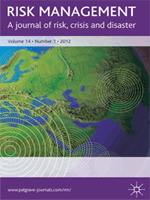
Risk Management-An International Journal
Innovating Strategies for Global ChallengesRisk Management - An International Journal is a premier publication dedicated to advancing the understanding and methodologies of risk management across various sectors, including business, finance, and economics. Published by Palgrave Macmillan Ltd in the United Kingdom, this journal not only maintains a robust presence in the scholarly community but also ranks in the Q2 category for Business and International Management and Finance, as well as Q3 for Economics and Econometrics and Strategy and Management. With its diverse scope and commitment to high-quality research, the journal provides essential insights for academics, practitioners, and students alike, helping to shape the future of risk management practices globally. While not an open-access journal, its rigorous peer-review process ensures that only the most impactful and relevant studies are featured. Covering topics that converge the years from 2006 to 2024, Risk Management represents a vital resource for those looking to deepen their knowledge in this critical field.
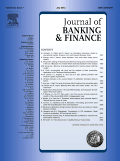
JOURNAL OF BANKING & FINANCE
Elevating Academic Discourse in Finance and EconomicsWelcome to the Journal of Banking & Finance, a premier publication in the fields of finance and economics, expertly published by Elsevier. With its esteemed Q1 ranking in both the Economics and Econometrics and Finance categories for 2023, this journal frequently garners significant attention from researchers, professionals, and academics alike. Established in 1977, it has become a crucial resource for the latest research and advancements in banking and financial services, influencing policies and practices on a global scale. The journal's commitment to high-quality, peer-reviewed content ensures that it not only contributes to academic discourse but also drives real-world financial innovation. As part of the respected Elsevier publishing collection, the journal's rigorous standards and comprehensive analysis serve as indispensable tools for those seeking to understand and navigate the complexities of the financial landscape. Located in the Netherlands, the Journal of Banking & Finance continues to play a vital role in shaping the future of financial research through its impactful insights and research contributions.